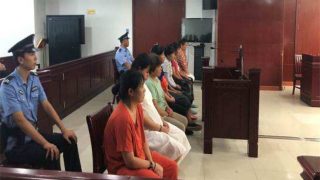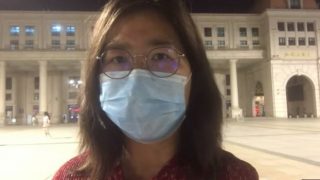
International scholars start asking the question whether what China is doing to the Uyghurs, members of Falun Gong, and other groups, should be properly qualified as genocide.
Massimo Introvigne
The international community is always reluctant to use the word “genocide.” It is a legal concept defined by international law, with clear consequences and implications. States and governments guilty of genocide should in principle become international pariahs, and individual politicians responsible for the genocide should be held accountable and tried by international courts. For this reason, it is very significant that respected international scholars are now seriously asking the question whether the persecution of religious minorities in China amounts to genocide.
Two scholars of University of Manitoba, in Canada, Maria Cheung and David Matas, together with legal expert Richard An and medical doctor Torsten Trey, of Doctors Against Organ Harvesting, have published this year in the journal Genocide Studies and Prevention an article qualifying as “cold genocide” what the Chinese Communist Party (CCP) is perpetrating against Falun Gong. Some of the authors are associated with Falun Gong, but this should not prevent readers from taking the article seriously. It has been published in the peer-reviewed journal of the International Association of Genocide Scholars, a main player in the academic study of genocide. Moreover, it is a well-researched article that would probably have passed the peer review in many other academic journals as well.
The article relies on a solid theoretical basis and on concepts introduced by genocide scholars such as Kjell Anderson and Sheri Rosenberg. Scholars have disentangled genocide from ethnicity long ago. A religious minority can be targeted by genocide even if it is not an ethnical group. Studies have also concluded that the usual model of the mass killing of a population in a short period of time is not the only form of genocide. “Cold genocide” has been defined as the persistent eradication of a group though killing, incarceration, and torture along a period of several years. This “slow motion genocide” offers to the perpetrators the advantage of being less noticeable. In this era of mass communication, bloodbaths cannot be ignored. However, a meticulous plan of extermination carried out through a multiplicity of attacks that become a daily routine is less noticeable. Even well-intentioned editors would tell reporters that reiterating similar news every week or months bore their readers.
The authors make their case that the attempt at exterminating Falun Gong is a case of cold genocide. They are aware of the main objection to this thesis. Some genocide scholars argue that genocide is physical extermination, with no alternatives for the victims. If the targets of mass violence can escape persecution by renouncing their beliefs, there is no genocide. Unlike victims of undisputed genocides such as Jews during the Holocaust, Falun Gong practitioners can escape persecution by renouncing their faith. Their situation is more similar to the one of Jehovah’s Witnesses in Nazi camps: they could have walked out by renouncing their religion (although almost none of them took advantage of the opportunity). Some scholars argue that the Nazi attempt to destroy the Jehovah’s Witnesses was not genocide, as the Nazis in their case wanted to exterminate a faith rather than a population.
The authors argue, however, that this interpretation is “inconsistent with the travaux preparatoires (preparatory works) of the Convention [on Genocide]. The inclusion of religious groups as protected groups indicates an intention to protect religious beliefs. A religion can always be renounced. To preclude a finding of genocidal intention where the victims were given an option to renounce denies the very protection that the Genocide Convention intended to confer on religious groups.”
The question comes out again in an article written by British scholar Kate Cronin-Furman, Lecturer in Human Rights in the Department of Political Science at University College London, and published in Foreign Policy on September 19, 2018.
She reviews the horrors perpetrated by the CCP against the Uyghurs and concludes they amount to “cultural genocide.” Here, again, the CCP is not physically exterminating the Uyghurs. The detention of one million of them in the dreaded “transformation through education” camps and the systematic restrictions to religious liberty is aimed at destroying their cultural identity as a Sunni Muslim population. Uyghurs who are successfully “reeducated” and renounce their Muslim faith can walk out of the camps and go home—at least theoretically, as they will be kept under watch and arrested again if they do not behave.
Cronin-Furman is aware of the fact that, for most scholars, this is not genocide under the Genocide Convention. They would point out that “although it was discussed at length during the drafting of the 1948 Genocide Convention, the distinction between physical and cultural genocide did not make it into the final document.”
This, Cronin-Furman notes, is only part of the story. “In practice, she writes this absence hasn’t been such a problem. The type of acts that qualify as cultural genocide generally occur alongside, or as a precursor to, mass violence. Nonviolent actions undertaken in pursuit of the destruction of cultural identity therefore often serve as the evidence of intent necessary for a mass slaughter to qualify as genocide. For example, the devastating violence unleashed against the Rohingya by Myanmar’s military has been accompanied by clear efforts to eliminate Rohingya cultural institutions and leaders.”
Cronin-Furman has two conclusions to offer. The first is that cultural genocide is better than physical genocide for the international image of a country, but is worse in terms of its costs-benefits ratio. A cultural genocide of the scale undertaken by the CCP against the Uyghurs requires an enormous mobilization of resources and huge financial costs. Additionally, the results are uncertain. People with a strong religious identity are often stubborn. Most Uyghurs resist “re-education.” And the attempt to justify the cultural genocide as “war on terrorism” has also been a failure. China keeps a pool of unconditional “friends” among Western politicians and journalists, but most independent international media are no longer buying fake news on the repression of Muslim Uyghurs as counter-terrorism. Cronin-Furman concludes that one day the CCP may realize that there is no other way to exterminate the Uyghur’s Islam than exterminating the Uyghurs themselves, thus confirming the received wisdom in genocide studies predicting that cultural genocide is just the precursor of physical genocide. Precedents, including the evolution of Nazi Germany and the anti-Rohingya campaigns in Myanmar, “set off alarm bells about how things might play out in Xinjiang. China’s actions reveal a clear intent to eradicate the perceived threat that Uighur identity poses to state security. It is currently employing the highest-cost strategy available in pursuit of this aim. If this proves too difficult, it is more likely that it will default to an easier approach than abandon its goals—with fatal consequences.”
The second comment is that the current legal definition of genocide dates back to 1948. After seventy years, it should perhaps be re-examined. Modern technologies offer to totalitarian regimes unprecedented opportunities and techniques for cultural genocide, which should perhaps be explicitly included in a revised definition.
Both cold genocide and cultural genocide create new challenges for genocide scholars and the international human rights community. The latter may want to lobby to have these forms of genocide officially recognized by international legal documents. In this case, it would become clear that the CCP is guilty of the cultural genocide of the Muslim Uyghurs and of the cold genocide of both Falun Gong and The Church of Almighty God. In the latter case, statistics show an order of magnitude in the persecution comparable to Falun Gong. As some have said, from the point of view of the CCP’s repressive machine, The Church of Almighty God is the new Falun Gong—which does not prevent the cold genocide of Falun Gong from continuing. The case of Tibet should also be considered, although the destruction of Tibetan Buddhist culture has followed a different path. Legalities aside, cultural genocide and cold genocide are obvious crimes against human rights. The international community should move decisively against its Chinese perpetrators.
Source: Bitter Winter / Massimo Introvigne



